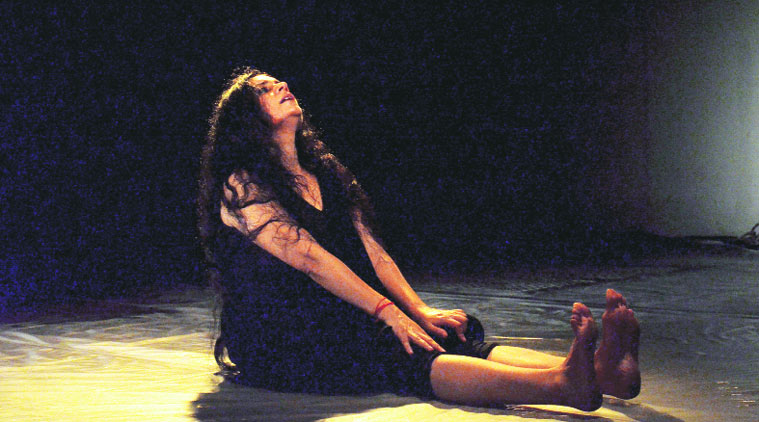Click here to follow Screen Digital on YouTube and stay updated with the latest from the world of cinema.
Jyoti Dogra sticks to her minimalist and experimental style of production with ‘Notes on Chai’
Jyoti Dogra’s play reveals how frivolous conversations between strangers are a reflection of an an insecure society.
 Jyoti Dogra’s experimental play, Notes on Chai, reveals how frivolous conversations between strangers are a reflection of an an insecure society.
Jyoti Dogra’s experimental play, Notes on Chai, reveals how frivolous conversations between strangers are a reflection of an an insecure society.
Small talk made Jyoti Dogra uncomfortable. She admits to going to great lengths to avoid using the elevator where people insist on filling the silence with mundane conversation. This changed two years ago. Under a vow of silence for 11 days at a meditation centre in Igatpuri, Nashik, she couldn’t focus as she sat with 200 other women. “I was bursting with curiosity. I wondered if the woman sitting next to me was married or why the one sitting across looked sad. The effort to stay silent helped me understand man’s desire for conversation. I began wondering if there is more meaning in small talk than it seems,” she says.
This “epiphany-of-sorts” forms the crux of Dogra’s latest play, Notes on Chai. Like her earlier works — The Doorway (2009), where she used a doorframe to explore concepts of open and closed spaces, or Kº (2011) where she brought to life Kafka’s characters — Dogra sticks to her minimalist and experimental style of production. A solo theatre piece with no props, Notes on Chai will be staged at the National Centre for the Performing Arts on February 21.
The play sees the theatre actor-director effortlessly slip in and out of everyday characters as they bump into each other at chai tapris, sweet shops and when queued up outside an LIC office. The small talk begins with strangers confessing their love for chai. “The idea was to explore everyday conversations between strangers. The questions are about weather, family or health, and the answers seem mundane at first. But if you listen closely, they’re sharing their existential problems, fears, desires and insecurities,” says the 43-year-old artiste. She cites the example of those who are quick to remark about any change in weight or complexion and before moving on to their own issues in life.
To illustrate her point, Dogra transforms into a shy newly-wed from Mathura, who doesn’t like “dip-dip chai” and prefers making her own tea with adrak. She confesses slyly that she enjoys this cuppa in the morning, before waking her husband up. “Not that I didn’t like his company,” she hastens to add, “but I like this time to myself.” The newly-wed then goes on to reveal that she wanted to audition for Indian Idol. “But my husband thought a government job is more suitable for someone simple like me,” she says. These seemingly simple admissions of the character, complete with the tone in which they are said, allow a glimpse into her life, where marriage hasn’t turned out to be what she had expected.
Over the course of the play, Dogra’s characters return to resume the conversation. The newly-wed, for instance, speaks about her secret fondness for whiskey, her sexual desires and how awkward her husband makes her feel in bed.
An equally important part of the play is the abstract sound that Dogra creates, which she uses to mark her transition from one character to another. Working for the past three years in throat singing techniques and western overtone singing, she uses a unique combination of both in her performance. “I spent three months listening to tantric Tibetian Buddhist chants in Dharamsala. It is a powerful sound that hits two to three notes through resonance and feels as if it’s a unique language the monks are using to converse between themselves,” she says. By infusing the chants of the Buddhist monks with the overtone music she learnt from a sound artiste, Dana Stratil in Zurich, the result is a reverberating score that uplifts her performance. “I’m trying to get people to listen to different sounds. Even if they can’t place it in a context, I want to introduce them to different kinds of conversations that happen through sound,” she says.
Notes on Chai will be staged at NCPA on February 21.
amruta.lakhe@expressindia.com
- 01
- 02
- 03
- 04
- 05


































